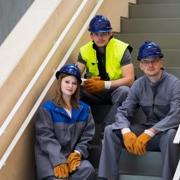Forms that build themselves
The founders of weave.ly, Jesse Zaman and Florian Myter, both performed their Phd in computer science at the Software Languages Lab of the Vrije Universiteit Brussel (VUB). Jesse obtained his PhD with a thesis on visual flow based programming. He develops weave.ly’s prototyping platform. Florian obtained his PhD with a thesis on data replication in distributed systems. He develops weave.ly’s business.
The technology behind weave.ly originates from an Innovris Anticipate project. This project resulted in the creation of DISCOPAR, an accessible visual programming language which enables citizens to set up their own so-called “citizen observatories” to collect, process, analyze and evaluate specific types of data. During this project, the technology was deployed to gather data and map mobility parameters on pedestrians in the Brussels Capital Region.
FLAMENCO, the successor to DISCOPAR, was a platform developed during a project funded by Agentschap Innoveren & Ondernemen (predecessor of VLAIO) and that aimed to deliver an open cloud-based software platform, designed for citizens to create and participate in citizen science campaigns. To confront major challenges of today, our society requires fundamental transitions in the way we deal with energy, buildings, mobility, environment and health. The FLAMENCO project was the first step to unlock the potential for collecting enormous volumes of highly localised, person-centric data, which can support policy makers to assess urban processes in a way that was hitherto impossible. During the 4 years of FLAMENCO, the platform was deployed at various partners of the user committee (i.e. Mobiel21, Fietserbond, Gents Milieufront, VITO)
Despite earlier projects’ focus on the domain of citizen science, the underlying technology could be generalised into a cloud-based software component toolbox to rapidly develop so-called Minimum Viable Products (MVPs). The early phases of digital product development require a lot of agility to rapidly design, develop, deploy and test novel ideas and features. This need for agility contrasts with current software development methods which still rely on textual programming by expensive and hard-to-find developers.
Making advanced survey creation effortless
Building on their roots in citizen science and large-scale data collection, Weavely.ai brings this vision into the world of AI-driven feedback and form generation. In earlier projects, they empowered individuals and communities to collect meaningful, localized data to inform urban policy and scientific research. Now, that same focus on accessible, high-quality data collection underpins their new mission: making advanced survey creation effortless.
They empower teams to rapidly create smart, AI-powered forms and surveys simply by describing their goals. Traditional survey tools require time-consuming manual setup, question design expertise, and ongoing adjustments, slowing down the process of gathering insights. Weavely transforms a simple prompt into a fully-formed survey or form, generating academically sophisticated, targeted questions instantly. By leveraging the latest advancements in generative AI, they eliminate the complexity of survey creation. This allows customer success managers, marketers, and non-technical users to quickly deploy and validate their ideas, streamlining feedback loops and accelerating informed decision-making.
Contact
Florian Myter, Co-founder
[E] florian@weave.ly
Jesse Zaman, Co-founder
[E] jesse@weave.ly

Milestones
- 2022: Raised €300K pre-seed round
- 2024: Launched MVP
- 2024: Raised €900K seed round

